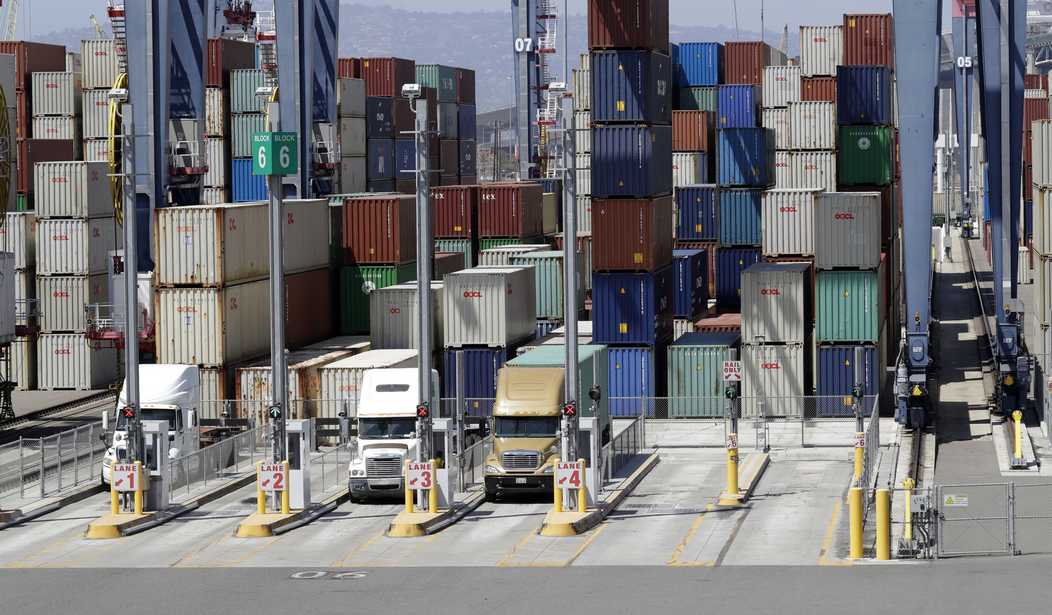We’re familiar with the supply chain crisis that has gripped our economy. Ships remain stuck in the ocean waiting to unload their cargo as the Biden administration puts bandaids on a gaping wound and Secretary of Transportation Pete Buttigieg plays Mr. Mom, posts stupid (and possibly illegal) memes, and worries about racist bridges.
But there’s another side to the shipping crisis: American farmers are watching their products ruin as they have trouble getting their goods out of the country. It’s basically the flip side of the supply chain stories you’ve heard over and over. In this case, the Asian shippers unload their cargo, skip out on loading their containers with American goods — including and especially agricultural products — and race back to Asia to reload with more items to sell in American markets.
But Congress is working to devise a solution. On Wednesday, the House passed the Ocean Shipping Reform Act by a 364-60 vote, a rare show of bipartisanship in this fractured age.
Fox News recounts a conversation with Rep. Dusty Johnson (R-S.D.):
Among the provisions in the bill, Johnson said the most important has to do with Asian ocean carriers that “unfairly discriminate against American cargo.” He said that they will offload foreign goods in U.S. ports then simply sprint back to Asia so they can bring more goods back to the U.S., rather than taking the time to fill up with American goods to sell abroad.
“You look at Valley Queen, they’re a cheese manufacturer in South Dakota. They had 2 million pounds of already sold lactose that has been sitting in a warehouse just waiting for a shipment,” Johnson said. “And a recent container load of lactose that they had sold… sat on the dock for 75 days.”
“It started to spoil. And just on that one container load that was a $25,000 loss. And we have this happening throughout the American manufacturing and agricultural supply chain,” he added.
Another farmer, a pork producer, told Congress about how his product is sitting on the docks so long that it has to be frozen, which won’t do in Asian markets, where consumers like their pork chilled and never frozen.
Related: Biden Is Bullying Businesses Over His Own Policy Failures
In October, some 80% of agricultural shipments out of ports in Southern California had to be canceled, and the contracts that suppliers sign with shippers don’t give farmers and agricultural companies much leeway in the behavior of Asian shippers. Johnson says that the Ocean Shipping Reform Act will remedy much of the problem, not by resorting to protectionism but by encouraging trade with Asia.
“If you’re going to use this shared infrastructure, you’re going to play fair, and you’re not going to have unprecedented levels of rejection of American cargo – which is what we’re seeing actual rejection a refusal to take this cargo,” he said.
He also claims that the bill also increases the efficiency of our supply chain.
“Overall, the bill really creates an environment where efficiency is rewarded for these ocean carriers, and so you have provisions in the bill whereby data exchanges can be set up and are really – they’re incentivized to set them up,” Johnson said. “That is going to make the whole system operate a lot better.”
The Ocean Shipping Reform Act is now in the Senate’s hands, and if President Biden signs it into law, it stands to be the most sweeping update to shipping laws in three decades, according to Johnson.
American shipping companies are hoping to look beyond Southern California to solve some of the supply chain woes.
Mike Jacob, vice president and general counsel for the Pacific Merchant Shipping Association, said “it’s important to us” to reestablish shipping connections in ports in both Northern California and the Pacific Northwest, adding three companies have dedicated direct service calls to the Oakland port while two more have plans to start in January.
We shouldn’t be surprised that private companies and organizations are seeking better options than what the Biden administration has offered. Between expanding out of Southern California and decent bipartisan legislation, maybe we’ll see some relief from the supply chain woes. And maybe American farmers won’t have to see their hard work go to waste.










Join the conversation as a VIP Member